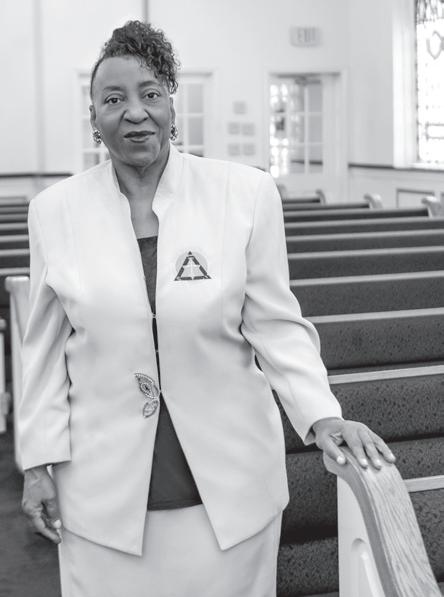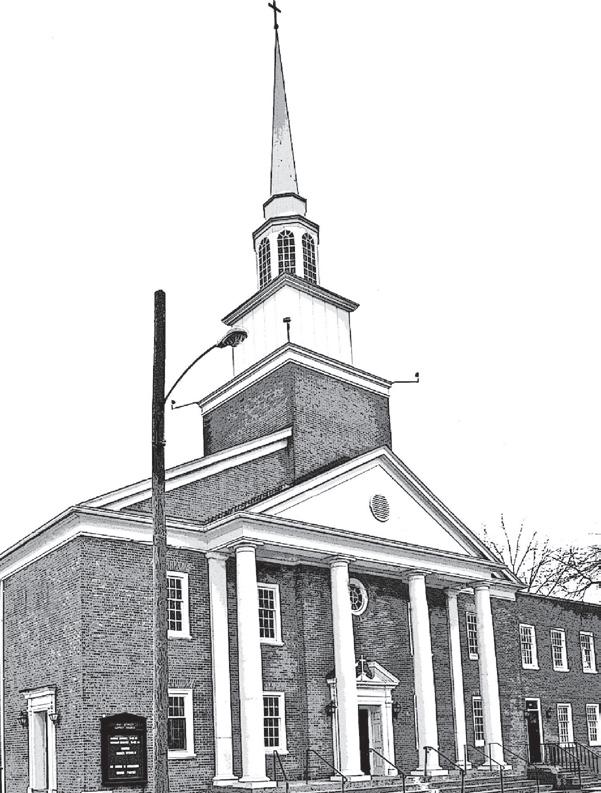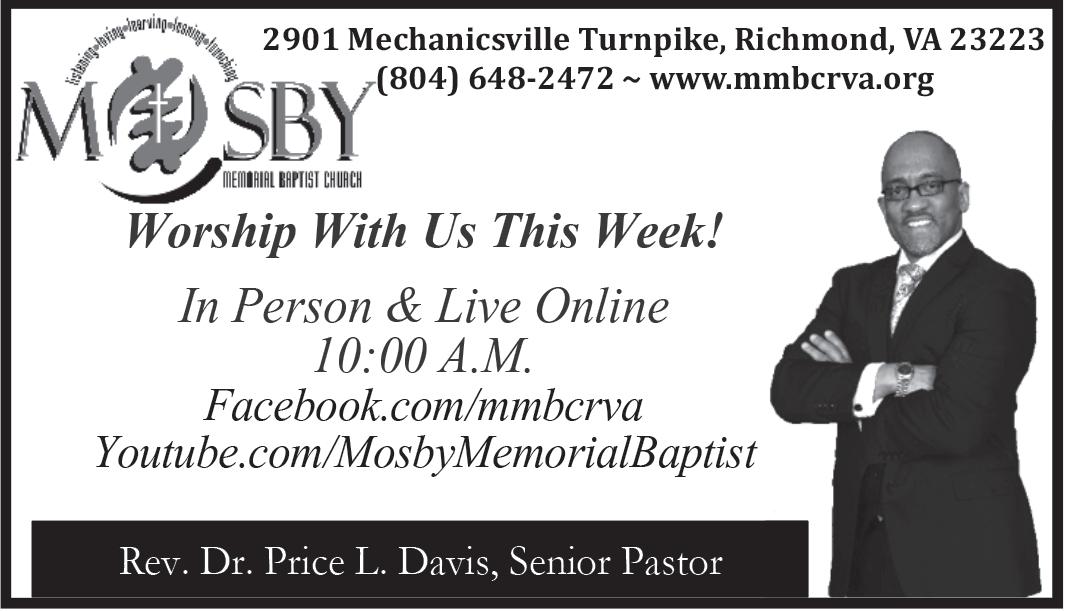




By George Copeland Jr.

The Dominion Energy 41st Annual Richmond Christmas Parade set off the holiday season Saturday, Dec. 7, starting at the Science Museum of Virginia on West Broad Street and continuing east to 7th Street. This jolly and rotund elf was held down by Henrico County’s Department of Parks and Recreation.
By Paula Phounsavath
State legislators from both parties gathered Monday at the General Assembly Building to launch the 2025 “Gotta Have Child Care” campaign, a bipartisan effort to address the growing gap in funding for affordable child care in Virginia.
During the press conference, state Sen. L. Louise Lucas, D-Portsmouth, joined delegates, business leaders and community advocates to stress the urgency of increasing legislative funding for child care programs. They emphasized the long-term benefits of investing in accessible and affordable care for families across the state.
Currently, more than 10,000 children from working families across Virginia are on waitlists for child care services.
Additionally, an estimated 165,000 children under age 6 statewide — spanning early learners to kindergartners — qualify for publicly funded child care based on household income and parental workforce participation, highlighting a significant gap between available resources and growing demand.
“These are working families that qualify for services based on their household income. However, there are not enough slots to meet demand,” Lucas said. “As a result, families are making hard decisions whether or not to work a job, work one that doesn’t cover the child care or stay at home and try to provide for the child care on their own.”
Not only is there a long waitlist for children, but child care has become in-

creasingly unaffordable statewide in recent years, especially for low-income families, as federal relief funds for post-pandemic economic and workforce recovery depleted.
The Joint Legislative Audit and Review Commission (JLARC) reported in an October 2023 data summary that full-time child care costs an average of $100 to $440 per week, per child, in addition to providers’ tuition fees. JLARC also reported that for single-parent or two-parent households, child care costs surpass 10% of the median income, which exceeds what the federal government considers unaffordable.
As a result of these concerns, Gov. Glenn Youngkin proposed a $448 million budget for the 2025-2026 biannual
Richmond City Council’s final meeting of the year was an emotional one, as members reflected on past achievements and looked ahead to the future. Outgoing council members Andreas Addison, Ann-Frances Lambert and Kristen Nye were honored for their service, marking a poignant moment in the city’s leadership transition.
“This is not a goodbye,” 6th District Representative Ellen F. Robertson said. “This is just another path of the journey, and we have no idea where it’s going to lead us but we know it’s going to lead us to great things and we look forward to it.”
Although Addison was absent from the meeting, a video montage of the departing council members’ work over the years and the kind words of fellow council members still made for a sendoff that moved those present.
“I’ve learned so much up here, everybody brings something to this body,” said an emotional Nye, who announced she wouldn’t seek re-election earlier this year. “I feel like we have really changed the direction of this city. We have done some amazing work.”
Chief Administrative Officer Lincoln Saunders later appeared during the meeting’s closing minutes, where he was acknowledged for his work and the collaboration between the city government and council. The meeting came hours after he announced his exit from the CAO role ahead of Mayor-elect Danny Avula’s inauguration on Jan. 1.
Former City Council member and House Delegate Michael Jones made a surprise appearance at the meeting. In addition to praising their successes, he presented Nye with a Virginia House resolution commending her 12 years in city government, including time on the Richmond School Board, and her accomplishments.
“The legacy that y’all will leave here, the work that you’ve done, the long hours,” Jones said of the departing council members. “Y’all have done a wonderful job in serving.”
When it came to the meeting’s agenda, council members
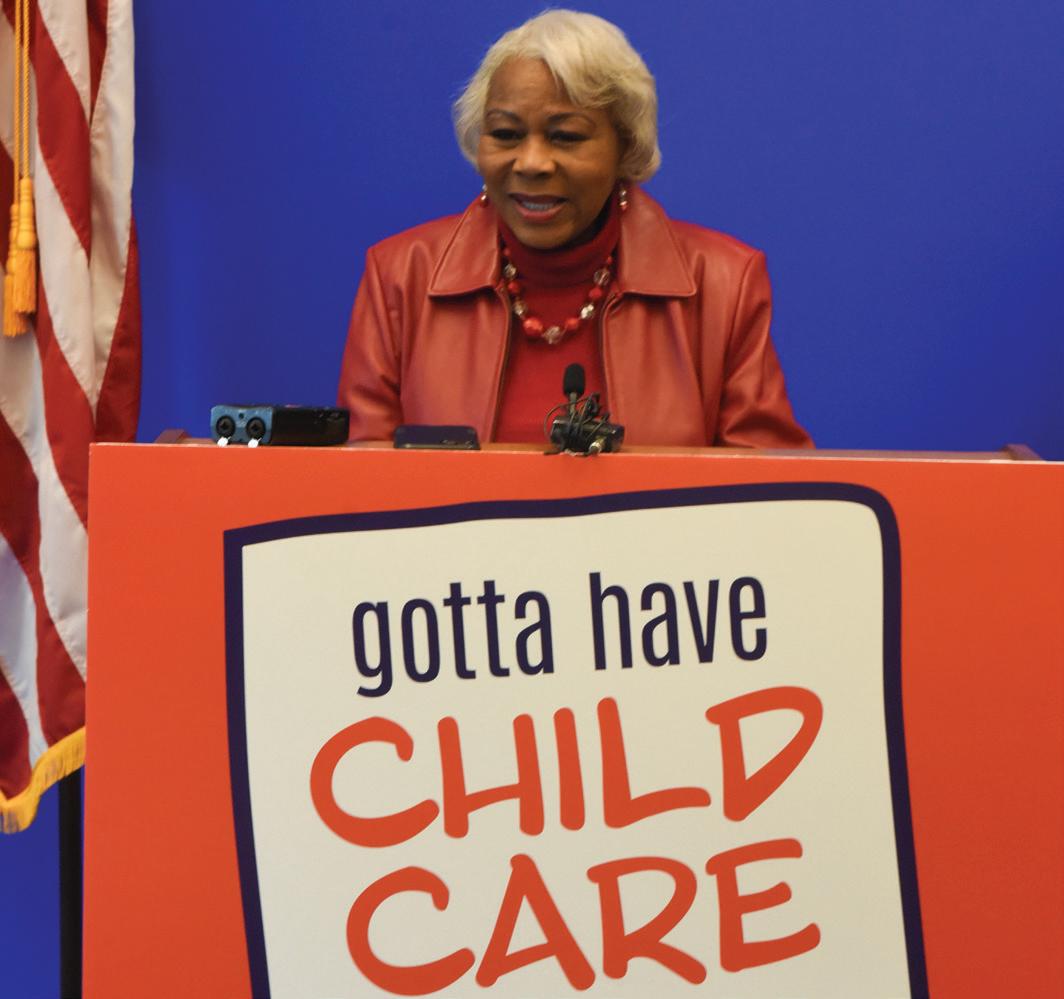
RVA Community Fridges stay cool with help after vandalism
By Brodie Greene
Taylor Scott founded RVA Community Fridges nearly four years ago, inspired by similar mutual aid initiatives in California and New Orleans. After growing hydroponic tomatoes in her apartment, she found herself with an “excessive
amount” and saw an opportunity to give back. Recently, when one of the 14 fridges maintained by the organization was vandalized twice in a week, Scott and her team of volunteers rallied support from the community to restore it.
She was 81. Giovanni, subject of the prize-winning 2023 documentary “Going to Mars,” died Monday, Dec. 9, 2024, with her lifelong partner, Virginia “Ginney” Fowler, by her side, according to a statement from friend and author Renée Watson.
“We will forever feel blessed to have shared a legacy and love with our dear cousin,” said Allison (Pat) Ragan in a statement on behalf of the family.

By George Copeland Jr.
Virginia Union University’s probation status will continue into 2025. VUU leadership announced the decision in a letter to the college’s community Tuesday, with the Southern Association of Colleges and Schools Commission on Colleges allowing VUU to remain accredited by extending the status into the coming year.
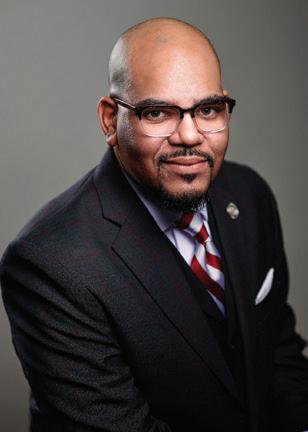
The SACSCOC, which operates as an accrediting agency, placed the school on probation in December of 2023, after years of monitoring the college, for failing to meet financial responsibility standards.
“Last year, we were asked to remedy a deficiency,” VUU President and CEO Hakim J. Lucas said in the letter. “This year, we are being asked to maintain renewed efficiency.”
Lucas acknowledged the disappointment the ongoing probation may spur in the VUU community, as a loss of accreditation would impact the university’s ability to access federal funding, students’ education and their post-graduation prospects.
However, Lucas remained optimistic that the college would “replicate the exceptional outcomes” achieved in the 2024 fiscal year, as VUU worked to improve its financial operations.
“We are confident in our ability to sustain and build upon successes as we continue the journey toward excellence reimagined,” Lucas said.
Farid Alan Schintzius, activist, dies at 76
By George Copeland, Jr.
Richmond activist Farid Alan Schintzius died Thursday, Dec. 5, 2024, at the age of 76, leaving behind a legacy of local advocacy and community engagement. Schintzius’ family confirmed his death on a social media post.
“Alan dedicated his life to leaving this world better than he found it by relentlessly pursuing love, beauty, and justice,” the post read. “If you would like to honor his memory please carry a small spark of his embers into the world and let it grow into a mighty flame!”
A native of Buffalo, N.Y., Schintzius attended Bishop Fallon High School and graduated from Daemen University in 1973. He later worked as a carpenter before moving to Richmond, where he became a cornerstone of the city’s counter-cultural and activist circles.
Schintzius helped found The Camel, a popular live music venue, and WRIR, Richmond’s independent radio station. He also ran for mayor in 2016.
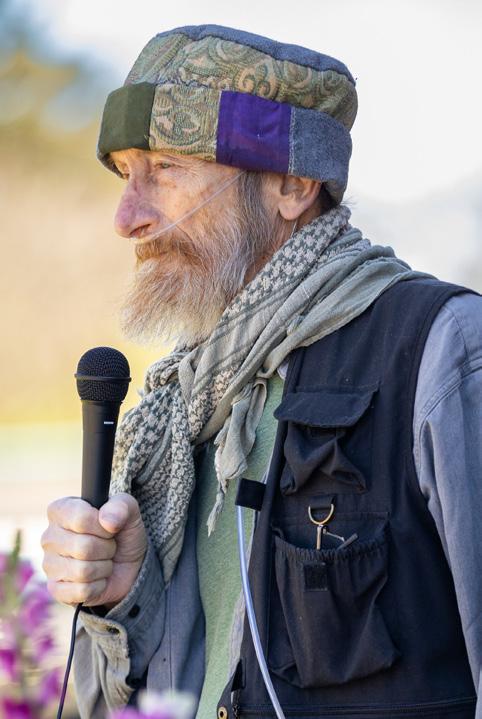
Schintzius was a passionate activist and an organizer affiliated with Occupy Richmond, a grassroots movement advocating for social and economic justice. He was widely recognized for championing initiatives focused on community engagement and addressing systemic inequality.
In 2024, Schintzius joined former legislator Viola Baskerville in forming the Save Community Hospital group in response to Virginia Union University’s plans for the former Richmond Community Hospital.
“In memory and honor of Farid Alan Schintzius, let us all carry a spark of activism into the world to make it a better place,” Baskerville wrote on the group’s social media.
Schintzius is survived by seven children and numerous friends and loved ones. A public memorial will be held near his birthday in April, with details to follow.
Free community testing for COVID-19 continues
For the week ending Saturday, Dec. 7, COVID-19 accounted for .6% of all emergency department visits in Virginia, with overall respiratory illness moderate and trending up compared to previous data. No deaths associated with COVID-19 were reported within that period at time of publication. COVID-19 wastewater levels for Richmond and Henrico County were below detection as of the most recent sample collection week on Sunday, Dec. 1.
The Richmond and Henrico County health districts are offering testing at the following locations:
• Thursday, Dec. 12, 2 to 4:30 p.m. - Calvary United Methodist Church, 1637 Williamsburg Road.
• Friday, Dec. 13, 11 a.m. to 1 p.m. - Southside Woman, Infants and Children Office, 509 E. Southside Plaza
• Wednesday, Dec. 18, 9 to 11 a.m. - East Henrico Recreation Center, 1440 N. Laburnum Ave.; 2 to 4:30 p.m.St. Luke’s Apartments, 117 Engleside Drive.
RHHD’s Resource Centers are providing free at-home tests for pickup at select locations:
• Creighton Court at 2150 Creighton Road, call 804-371-0433.
• Fairfield Court at 2311 N. 25th St., call 804-786-4099.
• Gilpin Court at 436 Calhoun St., call 804-786-1960.
• Hillside Court at 1615 Glenfield Ave., call 804-230-7740.
• Mosby Court at 1536 Coalter St., call 804-786-0204.
• Southwood Court at 1754 Clarkson Road. Unit #B, call 804-230-2077.
• Whitcomb Court at 2106 Deforrest St., call 804-786-0555. For Virginia Department of Health testing locations, visit vdh. virginia.gov. Additional testing site information can be found at vax.rchd.com. Want a COVID-19 vaccine?
Individuals interested in receiving the COVID-19 vaccine can schedule an appointment with the Richmond and Henrico health districts by calling (804) 205-3501. Additionally, vaccines.gov provides a list of pharmacies and clinics offering the vaccine. You also can find locations by texting your ZIP code to 438829 or calling 1-800-232-0233.
The Centers for Disease Control and Prevention also offers a vaccine locator at vaccines.gov. Residents also can order four free at-home COVID test kits at covidtest.gov, while supplies last.
The CDC recommends the COVID-19 vaccine for everyone age 6 months and older. Pfizer-BioNTech and Moderna vaccines are approved for ages 6 months and up, while Novavax is for those 12 and older. Vaccines are now available at pharmacies and health care providers. Compiled by George Copeland Jr.
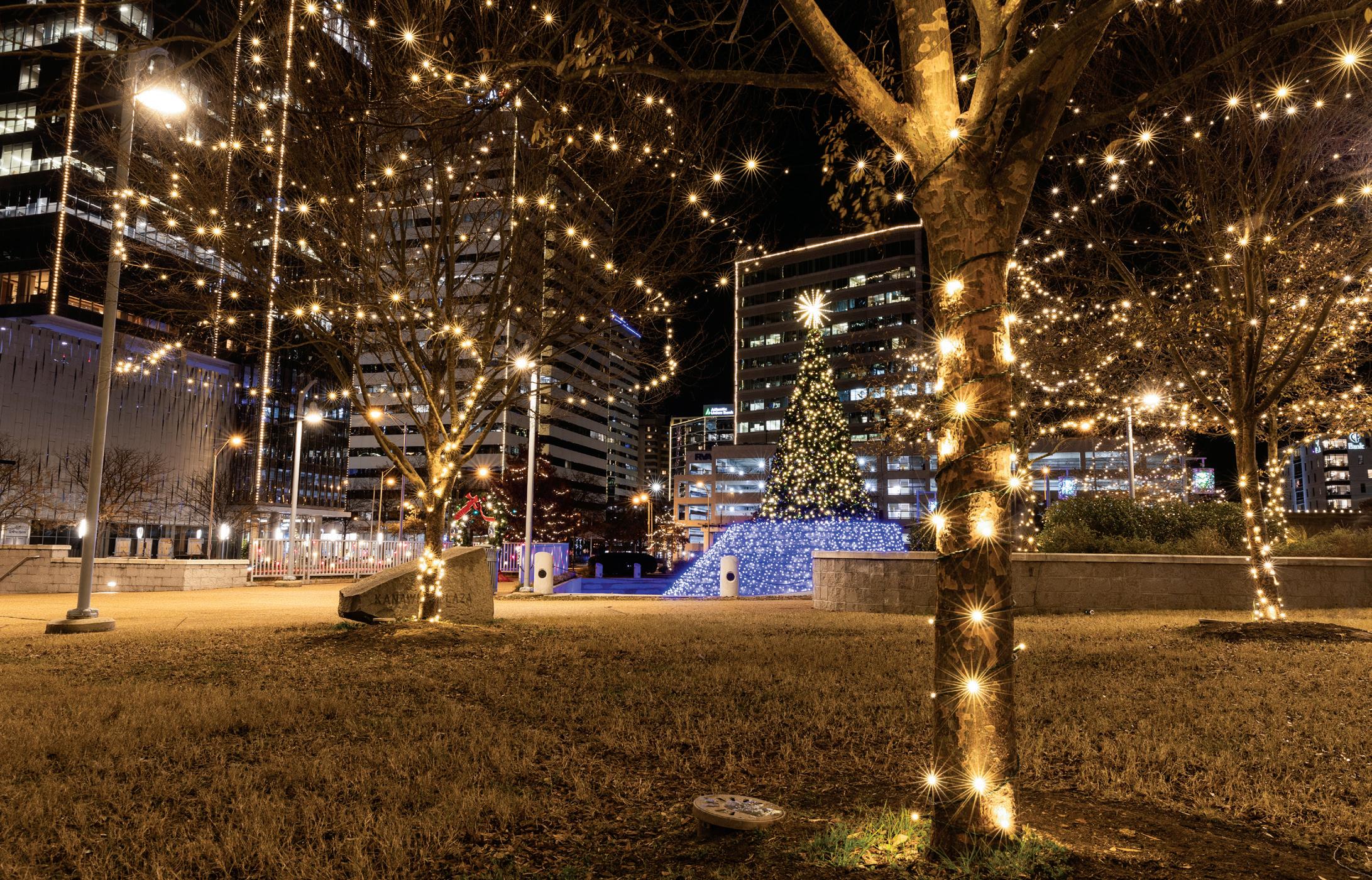
Slices of life and scenes in Richmond
By Paula Phounsavath
Delegate Delores L. McQuinn, DHenrico, officially launched her re-election campaign Tuesday afternoon at Trevor’s Grill and Tavern in Henrico.
“I am eternally grateful for the commitment, for your strength, for your wisdom that you share with me,” McQuinn told her supporters. “I’m looking forward to working to continue to do this work.”
The announcement, supported by local and state officials, including Sen. Lamont Bagby and Delegate Rae Cousins, marks McQuinn’s bid for a second term representing the 81st District in the Virginia House of Delegates.
“Delegate McQuinn has definitely been a mentor to me,” said Cousins, who started her term earlier this year. “She’s provided words of encouragement when I’ve needed them and so I am just so thrilled to support her. I know that she cares about her community.”
McQuinn, who represents New Kent, Charles City, parts of Chesterfield and Henrico County, represented Virginia’s 70th District from 2009 until 2022, due to its redistricting in November 2020. She won the 81st District delegate seat in 2023 with 94% of the vote and was sworn into office on Jan. 10.
Throughout her terms as a delegate, McQuinn has been a member of numerous House committees such as education, transportation and appropriations. During the 2020 legislative session, she was the first African American woman chair of the House of Transportation Committee in 2021. McQuinn was the chief patron of HB-1514, known as the Crown Act, a bill that prohibits discrimination based on natural hair texture or styles such as braids, locs and twists.

Before serving in the House, she served on the Richmond
from 1992 to 1996 and on City
McQuinn’s re-election campaign will continue to prioritize equitable transportation and combating food insecurity. She also expressed concern over the potential challenges in education and governance that could arise from national leadership changes, particularly referencing the uncertainty surrounding the incoming administration of President-elect Donald Trump.
“There are going to be some major changes and our people – the roles that we represent – have to be able to look toward us for leadership and helping them to navigate those systems that are put in place,” she said. “Being a team player and
working together on the behalf of others is going to guarantee not to make things perfect, but to at least, make it better.”
McQuinn is running against challenger Alicia Atkins, who became the first Black woman to represent Henrico County’s Varina District on the School Board in 2019. Atkins won re-election last year with 73% of the vote. She is running for the 81st District as a Democratic candidate, her platform emphasizes quality education, leadership accountability, environmental sustainability and community empowerment.
McQuinn said Atkins has the right to run for office like anyone else.
“This is a democracy. I support democracy,” she said. “I support making sure that whoever desires to run that is their right.”
Chisholm posthumously awarded Congressional Gold Medal
On Monday, U.S. Rep. Barbara Lee (D-CA) attended the signing of the Shirley Chisholm Congressional Gold Medal Act at the U.S. Capitol. This bipartisan legislation posthumously awards the Congressional Gold Medal to Shirley Chisholm, the first Black woman elected to the U.S. Congress, in recognition of her groundbreaking contributions to politics, activism and civil rights.

Vice President Kamala Harris signed the bill into law, honoring Chisholm’s historic achievements, including her 1968 election as the first African American woman in Congress and her 1972 presidential bid, which made her the first Black woman to seek a major political party’s nomination for president. In a statement, Lee expressed her honor in standing next to Harris during the signing.
“It is critical for the next generation of leaders to see the first Black woman elected to Congress get the recognition she deserves,” she said.
The legislation recognizes Chisholm’s advocacy for racial and gender equity, her role in championing the rights of women and minorities and her lasting impact on the political landscape. The bill highlights how Chisholm’s election to Congress and presidential candidacy raised the aspira-

tions of African Americans and women in politics. Her legacy continues to inspire future generations of leaders.
During her seven terms in Congress, Chisholm introduced 50 pieces of legislation, including key advocacy for civil rights, women’s rights, and opposition to the Vietnam War. She co-founded the National Organization for Women and was a vocal advocate for low-income communities. Chisholm died Jan. 1, 2005, but her legacy lives on.
and
and

Continued from A1
approved a wide range of ordinances and resolutions during the over two hour-long meeting, including endorsing legislative and budget proposals for the Virginia General Assembly’s 2025 session.
The proposals include requests for legislation or a study on Long-term Owner Occupancy Programs to address gentrification, authority to expand the use of speed cameras to college campuses, and renewing the ability of localities to collect all sales tax revenue from “integral” public facilities like convention centers and hotels.
Ordinances also were approved to support the efforts of the JXN project, which seeks to highlight Richmond’s role in African American history through preserving the Jackson Ward neighborhood. The nonprofit has been granted $950,000 allocated from the the Virginia Department of Historic Resources to reconstruct the Skipwith-Roper Cottage, the home of one of the city’s first Black homeowners, and a special
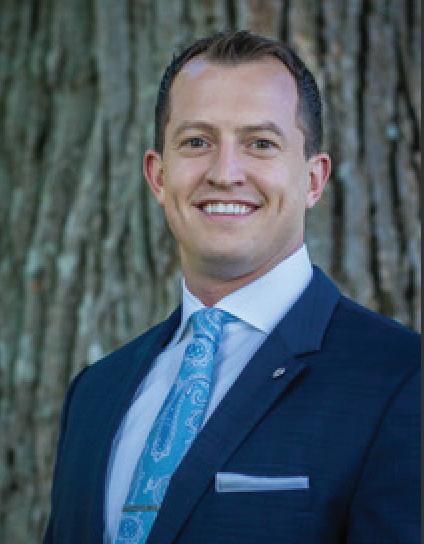
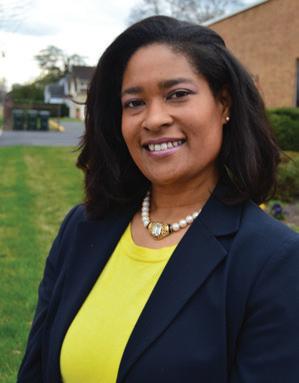

use permit to operate it as a museum and community center, among other uses.
City Council also voted unanimously to appoint Matthew Slaats as interim chief of staff, who will succeed LaTesha Holmes in the role.
The vote that garnered the most discussion of the evening was a reconsideration over how two waste facilities, the Hopkins Road Transfer Station and the East Richmond Road Convenience
Center, in Richmond’s South Side would be managed.
Waste Management of Virginia, who previously oversaw the sites, and Meridian Waste Virginia both made bids for the franchise agreement. Both businesses also had representatives present at the meeting to argue against or in favor of the current contract.
City Council previously had approved Meridian to handle the sites in October, with a contract bid that included roughly $4.5 million in service fees, only for the adopted ordinance to be reconsidered in November and continued to Monday due to what Nye described as “an incorrect recommendation of staff.”
“Staff incorrectly concluded the bid most favorable to the city was Meridian,” Department of Public Works Director Bobby Vincent Jr. said during Monday’s meeting. “We recommend Waste Management.” Council members voted to accept Waste Management’s bid of around $3.7 million, with Stephanie Lynch, 5th District, and Nicole Jones, 9th District, abstaining. The next City Council meeting is scheduled for Monday, Jan. 13.
Continued from A1
fiscal year on Virginia’s early learning and child care programs, including $25 million to develop partnerships with the private sector on child care needs.
In addition, state legislators have proposed numerous bills such as House Bill 407 from Delegate Phil Hernandez, D-Norfolk, which provides families with government assistance to qualify for the Child Care Subsidy Program.
Though Virginia has made progress in expanding funds toward child care, Delegate Carrie Coyner, R-Chesterfield, said those temporary funds will end in the coming months.
“Every dollar we spend comes back to us for long-term investments. It’s a short-term investment in our youngest learners, for a long-term investment in families and businesses across Virginia,” she said. “But, to reap those long-term rewards, we have work to do right now.”
The “Gotta Have Childcare” campaign outlined solutions to address parental demand, including raising the benchmark cap
Continued from A1
“We don’t have staff that stocks the fridges — it’s community members who take the time off their day to help us keep these full,” Scott said. “When you see them wasted and not going to the community like we intended them to, it’s heartbreaking.”
Posts about the incident sparked conversations on social media, with many expressing outrage. Despite the heartbreak, Scott doesn’t want to vilify the person responsible for damaging the fridge. She explained that similar incidents have occurred before, and often, the individuals involved may be facing personal challenges.
“Most of the time it’s someone in crisis who may need resources, may need assistance and utilizes the fridges, that may be hurting the fridge itself. But that’s not any reason for us to punish them,” Scott said.
In response to online posts about the vandalism, people donated money and food to help restock the fridge. Scott was both amazed and grateful for the support, which allowed her team to fund trips to the grocery store.
“We sent community members out there over the weekend to go to the grocery store on their own and grab whatever they wanted, and we reimbursed them,” Scott said.
This particular fridge has been moved twice now. It was originally located at Black Rabbit Tattoo, before moving to Tequila & Deadlifts two years ago. Scott and her team of volunteers found a new location for the fridge in front of Shelf Life Books in Carytown. Chris McDaniel, co-owner of Shelf Life Books, welcomed the addition and assisted with putting together a pallet for the fridge to sit on.
“We were excited, we really weren’t sure if we could do it, you know. We had to measure and see where we had outlets and everything like that but we were absolutely like ‘if we can do this, let’s do it,’” McDaniel said.
Scott hopes the new location will deter further vandalism. She recognized that some have suggested the installation of cameras to deter future incidents, but worries that cameras could deter people from using the fridges.
“We’re not here to be a part of the systems that are surveilling our community,” Scott said. “For some people, having a camera above them to do that might make them uncomfortable.”
Information on how to donate and a map of the organization’s pantries and fridges is available at rvacommunityfridges.com.
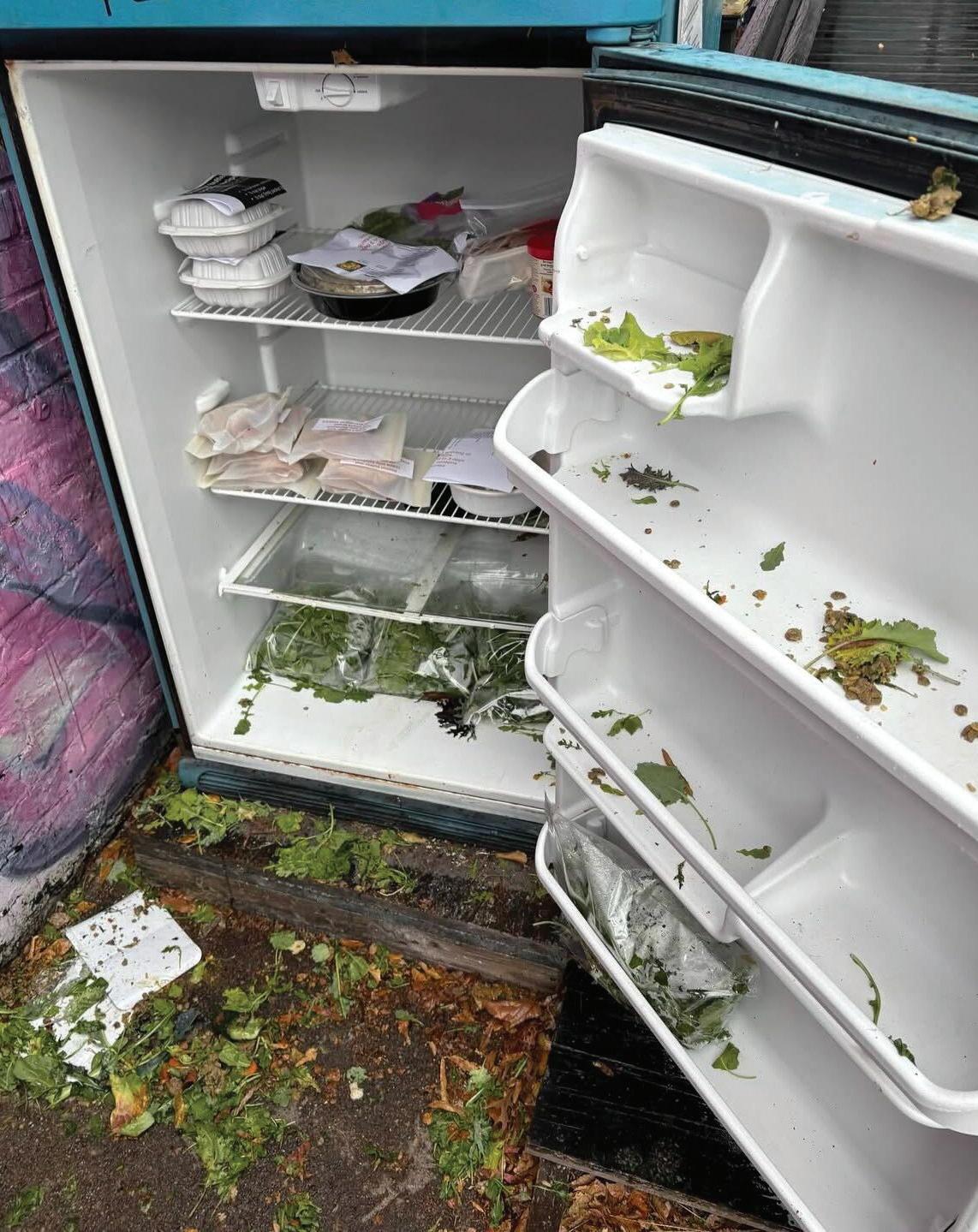
for eligible families from 42% to 50% by the 2026 fiscal year, establishing a predictable funding formula for state agencies, and creating a dedicated fund to optimize child care investments.
The campaign also is proposing further partnerships with the private sector to incentivize contributors and revenue streams to increase the supply of child care services such as tax incentives, capital and economic incentive funds and zoning.
While the campaign’s solutions aim to promote equity, Coyner, cautioned that they could unintentionally place additional burdens
on child care providers. The Virginia Secretary of Education’s Commission on Early Childhood Care and Education has explored options such as compensating providers based on children’s attendance or enrollment.
“It’s just really important that when you look at one side of a solution, you think about the consequences,” Coyner said. “Then, you try to balance that and build in place ways to positively move us forward while not negatively impacting our families that are currently receiving services.”

Continued from A1
The author of more than 25 books, Giovanni was a born confessor and performer whom fans came to know well from her work, readings and other live appearances and her years on the faculty of Virginia Tech, among other schools. Poetry collections such as “Black Judgement” and “Black Feeling Black Talk” sold thousands of copies, led to invitations from “The Tonight Show” and other television programs and made her popular enough to fill a 3,000-seat concert hall at Lincoln Center for a celebration of her 30th birthday.
In poetry, prose and the spoken word, she told her story. She looked back on her childhood in Tennessee and Ohio, championed the Black Power movement, addressed her battles with lung cancer, paid tribute to heroes from Nina Simone to Angela Davis and reflected on such personal passions as food, romance, family and rocketing into space — a journey she believed Black women uniquely qualified for, if only because of how much they already had survived. She also edited a groundbreaking anthology of Black women poets, “Night Comes Softly,” and helped found a publishing cooperative that promoted works by Gwendolyn Brooks and Margaret Walker among others.
For a time, she was called “The Princess of Black Poetry.”
“All I know is the she is the most cowardly, bravest, least understanding, most sensitive, slowest to anger, most quixotic, lyingest, most honest woman I know,” her friend Barbara Crosby wrote in the introduction to “The Prosaic Soul of Nikki Giovanni,” an anthology of nonfiction prose published in 2003. “To love her is to love contradiction and conflict. To know her is to never understand but to be sure that all is life.”
Giovanni’s admirers ranged from James Baldwin to Teena Marie, who namechecked her on the dance hit “Square Biz,” to Oprah Winfrey, who invited the poet to her “Living Legends” summit in 2005, when other guests of honor included Rosa Parks and Toni Morrison. Giovanni was a National Book Award finalist in 1973 for a prose work about her life, “Gemini.” She also received a Grammy nomination for the spoken word album “The Nikki Giovanni Poetry Collection.” Giovanni had a son, Thomas Watson

were strong, she edited the Fisk literary magazine and helped start the campus branch of the Student Non-Violent Coordinating Committee. But she rebelled against school curfews and other rules and was kicked out for a time because her “attitudes did not fit those of a Fisk woman,” she later wrote. After the school changed the dean of women, Giovanni returned and graduated with honors in history in 1967.
Giovanni relied on support from friends to publish her debut collection, “Black Poetry Black Talk,” which came out in 1968, and in the same year she self-published “Black Judgement.” The radical Black Arts Movement was at its height and early Giovanni poems such as “A Short Essay of Affirmation Explaining Why,” “Of Liberation” and “A Litany for Peppe” were militant calls to overthrow white power. (“The worst junkie or black businessman is more humane/than the best honkie”).
“I have been considered a writer who writes from rage and it confuses me. What else do writers write from?” she wrote in a biographical sketch for Contemporary Writers. “A poem has to say something. It has to make some sort of sense; be lyrical; to the point; and still able to be read by whatever reader is kind enough to pick up the book.”
Giovanni, in 1969. She never married the father, because, she told Ebony magazine, “I didn’t want to get married, and I could afford not to get married.” Over the latter part of her life she lived with her partner, Fowler, a fellow faculty member at Virginia Tech. She was born Yolande Cornelia Giovanni Jr. in Knoxville, Tenn., and was soon called “Nikki” by her older sister. She was 4 when her family moved to Ohio and eventually settled in the Black community of Lincoln Heights, outside Cincinnati. She would travel often between Tennessee and Ohio, bound to her parents and to her maternal grandparents in her “spiritual home” in Knoxville. As a girl, she read everything from history books to Ayn Rand and was accepted to Fisk University, the historically Black school in Nashville, after her junior year of high school. College was a time for achievement, and for trouble. Her grades
Her opposition to the political system moderated over time, although she never stopped advocating for change and selfempowerment, or remembering martyrs of the past. In 2020, she was featured in an ad for presidential candidate Joe Biden, in which she urged young people to “vote because someone died for you to have the right to vote.”
Her best known work came early in her career; the 1968 poem “Nikki-Rosa.” It was a declaration of her right to define herself, a warning to others (including obituary writers) against telling her story and a brief meditation on her poverty as a girl and the blessings, from holiday gatherings to bathing in “one of those big tubs that folk in chicago barbecue in,” which transcended it.
“and I really hope no white person ever has cause to write about me because they never understand Black love is Black wealth and they’ll probably talk about my hard childhood and never understand that all the while I was quite happy”
By Haleluya Hadero
Associated Press
The
TikTok asked a federal appeals court on Monday to bar the Biden administration from enforcing a law that could lead to a ban on the popular platform until the Supreme Court reviews its challenge to the statute.
The legal filing was made after a panel of three judges on the same court sided with the government last week and ruled that the law, which requires TikTok’s China-based parent company ByteDance to divest its stakes in the social media company or face a ban, was constitutional.
If the law is not overturned, both TikTok and its parent ByteDance, which is also a plaintiff in the case, have claimed that the popular app will shut down by Jan. 19, 2025. TikTok has more than 170 million American users who would be affected, the companies have said.
In their legal filing on Monday, attorneys for the two companies wrote that even if a shutdown lasted one month, it would cause TikTok to lose about a third of its daily users in the U.S.
The company also would lose 29% of its total “targeted global” advertising revenue for
next year as well as talent since current and prospective employees would look elsewhere for jobs, they wrote.
“Before that happens, the Supreme Court should have an opportunity, as the only court with appellate jurisdiction over this action, to decide whether to review this exceptionally important case,” the filing said.
It’s not clear if the Supreme Court will take up the case. But some legal experts have said the justices are likely to weigh in on the case since it raises novel issues about social media platforms and how far the government could go in its stated aims of protecting national security.
President-elect Donald Trump, who tried to ban TikTok the last time he was in the White House, has said he is now against such action.
In their legal filing, the two companies pointed to the political realities, saying that an injunction would provide a “modest delay” that would give the incoming Administration time to determine its position — which could moot both the impending harms and the need for Supreme Court review.”
Attorneys for the two companies are asking the appeals court to decide on the request for an

Movieland at Boulevard Square, Richmond’s only firstrun movie theater within the city limits, is undergoing its most significant renovation since opening in 2009. The multimillion-dollar project will enhance the movie-going experience with new features and upgraded amenities.
“Over the next six months, we will construct two new BTX: Bow Tie Extreme large-format auditoriums with 50-foot-wide screens, Dolby Atmos sound, and electric recliner seating,” said Ben Moss, co-founder and managing partner of Bow Tie Partners.
Moss added the project will also “upgrade the seating in all auditoriums to luxury electric recliners with integrated tables, increase screen sizes in multiple auditoriums, construct
and open Playland Arcade at Movieland, a state-of-the-art family-friendly arcade and duckpin bowling experience.”
by spring 2025. Guests can preview the new recliners in Movieland’s lobby.
The theater, located at the intersection of North Arthur Ashe Boulevard and Leigh Street, is owned by Bow Tie Partners, a familyoperated entertainment and real estate company with a history rooted in vaudeville and early motion picture the-

Other improvements include an expanded kitchen and bar facility to enhance food and beverage offerings. Six auditoriums featuring the new electric recliner seating will open in time for Christmas, with the remaining renovations expected to be completed


Editorial Page
December 12-14, 2024
Once in a while, there comes a crisis or current event that lets us know how many Americans feel about a particular issue. The hearts and minds of the people who make up this country are diverse and complex, and it’s hard to predict how people will react to situations when they arise. That’s why some observers were surprised when UnitedHealthCare CEO Brian Thompson was shot and killed on a Manhattan sidewalk on Dec. 4, that a lack of sympathy was evident in the public’s response to this violent act.
In New York, people deliberately dressed like the gunman and met in Central Park, where he was believed to have headed after the shooting. Internet sleuths, who devote their personal time to helping the police solve crimes that are unusually difficult, decided to sit this one out. Elsewhere online, social media posts such as one that read, “Thoughts and prayers require prior approval,” went viral. His employer, along with his immediate family and a handful of politicians and executives offered sympathetic statements, but they were barely noticed in the outrage.
There were two stories happening here. One involved the manhunt for the suspect in the shooting, who was captured this week at a Pennsylvania McDonald’s with a handful of hash browns that he realized too late should’ve been a to-go order. As that story has reached its conclusion, perhaps it’s time to focus on the other topic that this incident has brought to light – Americans have grown increasingly frustrated with the health insurance industry.
“I have stage 4 metastatic lung cancer,” a woman wrote on Thompson’s social media. “We’ve just left [UnitedHealthcare] because of all the denials for my meds. Every month there is a different reason for the denial.”
Stories like hers are all too common, and Thompson’s murder has cast a harsh spotlight on the health insurance industry’s tarnished reputation. The question now is what will the industry do about it? So far, responses from industry executives have been mixed. Anthem Blue Cross Blue Shield reversed a controversial policy limiting anesthesia coverage during surgeries, but didn’t say their decision was connected to recent events. Other companies have scrubbed their websites to hide the names and biographies of their executives. Earlier this week, the CEO of UnitedHealth Group, Andrew Witty, in a leaked video, said the company will continue to prevent “unnecessary” and “unsafe” care. He also reportedly said that criticism of the insurance company “does not reflect reality.”
The reality is that many people are sick of the way they and their loved ones have been treated by private health insurance companies. This violent event, along with the viral posts and public displays, shows that people want change. Will the health insurance system make changes that put patients first — or continue to stretch the limits of everyone’s patience?

How faith calls us to
Reflections on God are common right now.
We are about to enter a new year. Many of us are getting ready to celebrate Christmas or Hanukah. With 2024 “virtually certain” to be the hottest year on record, some may look at the symptoms of the climate crisis – the extreme heat, the fires and floods, the climatecharged cyclones – as signs of God’s wrath.
“moral case” for the rampant extraction and burning of fossil fuels. Wright portrays fossil fuels like oil, gas, and coal as virtuous. He has even called goals to reduce greenhouse gas emissions “perverse.”
more than mental gymnastics. It requires willful dishonesty.

Whether you believe in the Bible, the Torah, the Quran, or are an atheist, we can all agree there is a moral imperative to address the climate crisis. After all, it kills people and destroys lives. The cause of the climate crisis – the burning of fossil fuels – is also responsible for plenty of death and destruction.
Donald Trump’s choice for Secretary of Energy Chris Wright and one of his picks to co-lead the so-called Department of Government Efficiency Vivek Ramaswamy seem to have a different message. It is one that turns the concept of morality on its head and distorts reality. Wright has invented a warped
What he leaves out is that the current and future American economy is powered by clean energy. The clean energy revolution is behind the rebirth of American manufacturing and is lifting people out of poverty. The jobs created pay well and are safer. And consumers are saving money with renewable
clean energy sources like solar and wind because they are now both more resilient and less expensive to produce than fossil fuels.
Ramaswamy said last year, “The reality is more people are dying of bad climate change policies than they are of actual climate change.”
It is a claim utterly backward, even Orwellian. The New York Times fact checked the statement and correctly rated it “false” with “no evidence to support this assertion.”
To pretend there is a moral case for fossil fuels requires
But let us look to scripture. It is as good a place as any to start, since the Bible and its lessons help guide so many people’s idea of morality. In it, God gave us a formula that certainly seems to be coming into focus today. Going back all the way to the beginning, God gave us the means to our own salvation or our demise. He gave us free will – along with His many commandments was the free will to choose whether or not to follow them. The other thing God gave us was fire.
Ultimately fire became electrical power. But it was the tool that allowed humanity to thrive; to give us light in the dark and warmth in the cold.
So, the energy we needed for warmth, light, and eventually transportation and more, came from burning things. And what people burned were the things that were most readily accessible and easy to harness – starting with wood, then oils from animals and trees, then coal, then petroleum, and so on. Over the eons, as the number of people increased exponentially, the accessibility of these finite sources began to shrink exponentially.
Whale species were hunted to the brink of extinction for their
Why didn’t Biden keep his promise?
Just once. Just once amid all the times that reporters asked President Biden whether he would give a pardon to his son, Hunter, who was facing a possible federal prison sentence, I wish I could have heard jolly Joe give the sort of re sponse that the late Chicago Mayor Rich ard J. Daley offered to such unwelcome questions.
I’m think ing of the time in the 1970s, still remembered by old-timers like me, when Daley jousted with reporters’ questions about his efforts to steer city insurance contracts to his sons.

speak for itself without making promises he could not keep.
Historians will no doubt explore what Biden was thinking in promising not to involve himself in the case against Hunter. But for now, it’s not hard to imagine that the president saw himself standing on firmer ground before Trump’s re-election changed
the outlook for Hunter Biden’s fortunes.
That’s one plausible explanation for why the elder Biden shocked many by announcing Dec. 1 that he was going back on his word and issuing a “full and unconditional pardon” of his son.
To anyone who thinks a father can’t help his sons, he responded, according to various accounts, something to the effect of “There’s a mistletoe hanging on my coattails.” In other words, mind your own beeswax. Such was the simplicity of “the Chicago Way.”
In those days, nepotism was not such a dirty word. It was, in words also attributed to Mayor Daley, a way for a public servant to “put his arms around his sons and help them.” Or to solidify an alliance, such as by hiring the offspring of a peer alderman or county board member.
Compared to those standards, Biden took quite a risk to his own reputation when he repeatedly made a promise to refrain from interfering in Hunter’s federal case, despite his constitutional right as president to pardon people of crimes. The president probably would have been better off letting his pardon power
Now he’s taking hits from a lot of Democrats in addition to the predictable Republicans who condemn the pardon as self-serving and hypocritical.
The president’s decree went so far as to cover not only the crimes of which he had been convicted, but also any “offenses against the United States which he has committed or may have committed or taken part in during the period from Jan. 1, 2014 through Dec. 1, 2024.”
That’s pretty thorough. Yet it’s not hard to see that the president anticipated the potential for further legal jeopardy for his son, including the possible referral of charges from the U.S. House Oversight Committee, which has been investigating the Biden family separately from the Justice Department’s prosecution of Hunter.
And let’s not forget we’re talking about Donald Trump, who seems to be looking for revenge against those who pur-
sued him and his associates for his alleged misdeeds in office and out. Yes, we have heard this from no less than Trump himself.
Recall also that Trump’s first impeachment in 2019 was predicated on allegations that he unlawfully solicited Ukrainian authorities to deliver evidence against Hunter Biden in order to influence the 2020 U.S. presidential election. He was saved from conviction by a party-line vote in the Senate.
Two weeks before the 2024 election, NPR counted more than 100 threats from Trump himself to investigate, prosecute, imprison or otherwise punish his perceived opponents. Trump escalated his “retribution” rhetoric against his fellow Americans whom he labeled “the enemy from within” and threatened to send in the National Guard or other military if “radical left lunatics” try to disrupt the process.
That’s our Donald. We’ve become accustomed to his sort of bloviation by now — and his retribution approach to justice.
The election is over. Prepare to live with the consequences.
I sympathize. I can only imagine how I would respond if I felt the power of the state being brought down on my son in trumped-up charges as retribution for something I, not he, may have done.
Resolving such tough disputes between the powerful is a major reason why the nation’s founders gave presidents the power to pardon. It’s not a perfect system or immune to abuse. But, it moves us in the right direction — toward justice.
The writer is a columnist for the Chicago Tribune.
oil. Island nations and huge swaths of the continents were deforested. For a long time, we thought the answer was to replenish the finite things to burn as best we could. But along the way, we realized God gave us infinite sources of energy that had always been abundant in the Garden: the sun and the wind. In the Bible, when humans finally understood the message and acted in ways God wanted, flood waters receded; fires stopped. So if saving lives, improving health outcomes, and expanding economic opportunity through more and better jobs are not enough of a moral calling to prioritize the clean energy transition, look to the Bible and listen to God. His message seems to be pretty clear. The writer is the Executive Director of the Sierra Club and a professor of practice at the University of Pennsylvania.




In his collection of essays and poems published in 1920 titled “Darkwater,” W.E.B. Du Bois wrote about his poignant encounter with the beauty of the Grand Canyon, the stupendous chasm in Arizona. As he stood at the canyon’s rim, the towering intellectual and civil rights activist described the sight that spread before his eyes. The Grand Canyon’s “grandeur is too serene – its beauty too divine!” Du Bois wrote. “Behold this mauve and purple mocking of time and space! See yonder peak! No human foot has trod it. Into that blue shadow, only the eye of God has looked.”
Park in Maine. “Why do not those who are scarred in the world’s battle and hurt by its hardness travel to these places of beauty and drown themselves in the utter joy of life?” Du Bois asked. The politics of racial purity
Roosevelt has been recognized as a “wilderness warrior” for his unprecedented protection of lands and wildlife. But his conservation record was tied to the belief of white racial superiority that was embodied in eugenics, the racist pseudoscience of the early 20th century that tried to determine who was fit or unfit to have children.
superior races, such as white Anglo Saxons and people of Scandinavian heritage.
“The problem of the conservation of our natural resources is therefore not a series of independent problems, but a coherent, all-embracing whole,” the report concluded. “If our nation cares to make any provision for its grandchildren and its grandchildren’s grandchildren, this provision must include conservation in all its branches – but above all, the conservation of the racial stock itself.”
Another of Roosevelt’s close associates took an even more pointed approach to white supremacy and conservation.

But Du Bois’ experience undermined a widely held assumption that was reinforced by early conservationists like Theodore Roosevelt –that only white people could appreciate the landscapes of national parks. For Roosevelt and his progressive allies, saving nature was connected to saving the white race.
My research on the history of national parks shows that these racial assumptions and federal policies contributed to making the parks unwelcome places for Black nature enthusiasts such as Du Bois. Du Bois traveled to national parks anyway, and he understood that most other Black people were unable to follow because of the cost and discrimination found at every turn. It still bothered Du Bois, however, that Black people were unable to experience a joy similar to what he found at what would later become Acadia National
One initiative of the Roosevelt administration was the creation of the National Conservation Commission on June 8, 1908. Though Congress eliminated the commission’s budget after six months, its task was to take an inventory of all the nation’s natural resources and make recommendations on how best to protect them.
Gifford Pinchot, the president’s most trusted environmental adviser, served as the commission’s executive chairman and compiled its final report in February 1909. It offered 10 far-reaching recommendations on topics as diverse as public health to labor regulation and the elimination of poverty and crime. The 10th recommendation advocated for “eugenics, or hygiene for future generations” that connected federal conservation to white supremacy.
Pinchot’s report called for the forced sterilization of “degenerates generally” – namely, most immigrants, Black and Indigenous people, poor white people and people with disabilities. It also sought to increase the breeding of what they believed to be racially
Madison Grant had worked with Roosevelt since the 1890s and was an avid conservationist. He was also the author of an influential book on eugenics, “The Passing of the Great Race,” a racist tome arguing the superiority of what he called the “Nordic race.”
New agency,
same philosophy
The election in 1912 of President Woodrow Wilson saw the implementation of discriminatory policies.
According to historian Eric S. Yellin, Wilson’s administration was “loaded with white supremacists” who effectively enacted harsh anti-Black policies in the federal government.
In 1913, for instance, Wilson ordered the federal workforce to be racially segregated, first at the U.S. Post Office, where most Black federal employees worked, and then at the Treasury Department, which had the second-largest number of Black workers.
The Wilson administration also created the National Park Service, the federal agency in charge of managing and interpreting the country’s national parks, when Wilson signed the
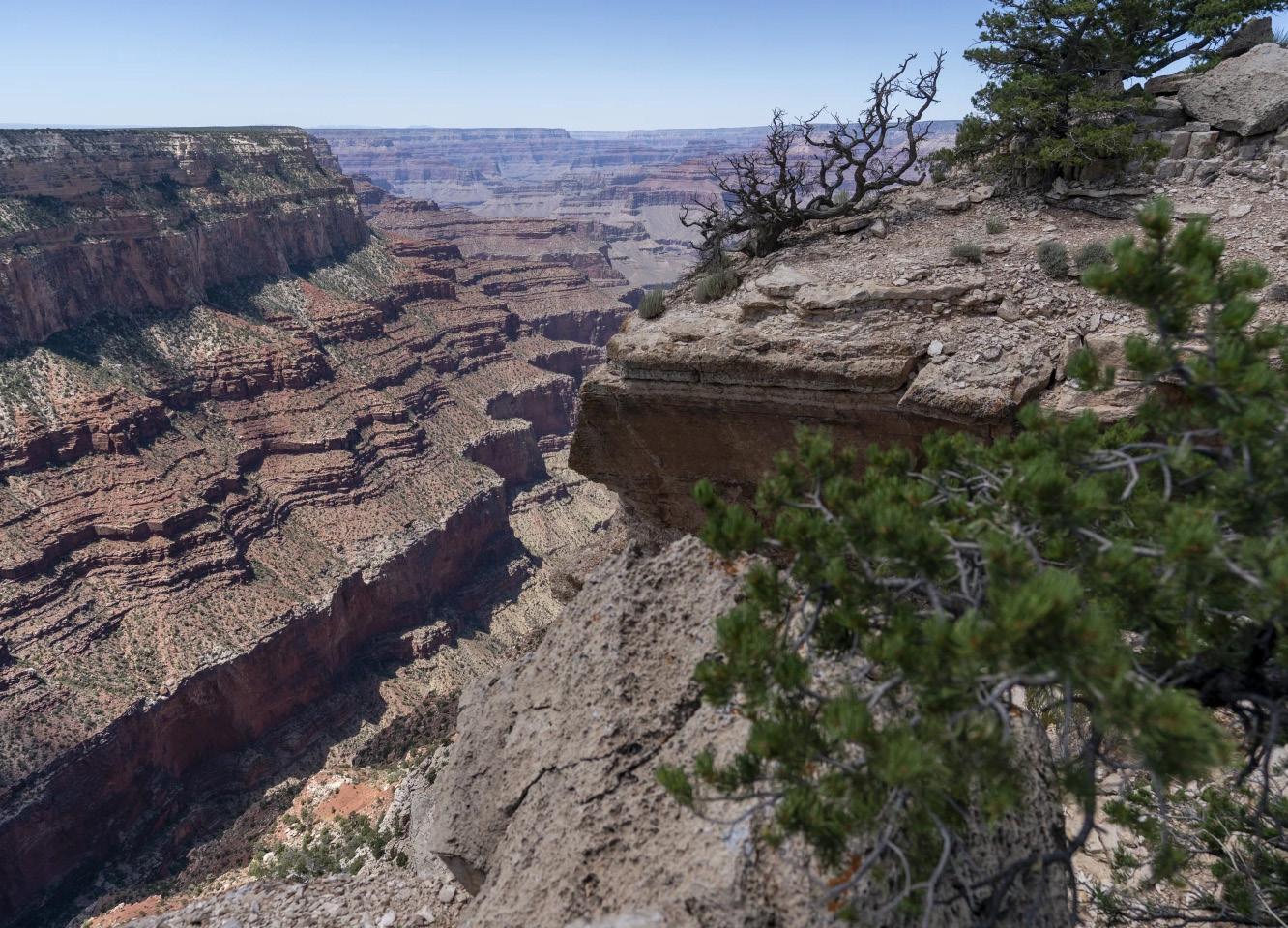
Organic Act in 1916.
Not surprisingly, this new park service had the same racial policies of the Wilson administration and abided by local laws on racial segregation. That meant Black nature enthusiasts would continue to be prohibited in national parks in most of the former Confederate South.
My research has shown that the National Park Service catered exclusively to the expectations and needs of white visitors and it had very few Black employees or visitors. The policies included racially segregated dining rooms, picnic grounds and restrooms. Maps and signs in some parks directed Black visitors away from white people and to designated Black sections of the parks.
The official policy didn’t end until 1945, when U.S. Interior Secretary Harold Ickes outlawed segregation at national
parks. But local segregation remained in practice in most Southern states for decades and still excluded Black visitors.
National parks worth the struggle Du Bois was willing to endure the racist laws that made traveling unpleasant for Black people seeking to find joy in natural beauty.
“Did you ever see a ‘JimCrow’ waiting-room?” Du Bois wrote in “Darkwater,” referring to the system of laws and social customs that disenfranchised Black people. “Usually there is no heat in winter and no air in summer. To buy a ticket is torture; you stand and stand and wait and wait until every white person at the ‘other window’ is waited on,” he explained. “Then the tired agent yells across, because all the tickets and money are over there.”
For Du Bois, the struggle was worth the experience of the Grand Canyon.
“There can be nothing like it,” Du Bois wrote. “It is the earth and sky gone stark and raving mad … It is human –some mighty drama unseen, unheard, is playing there its tragedies or mocking comedy, and the laugh of endless years is shrieking onward from peak to peak, unheard, unechoed, and unknown.”
The sight of the Grand Canyon, Du Bois concluded, “will live eternal in my soul.” The same view has had the same effect on generations of visitors – Black, white and of countless other backgrounds –ever since.
The writer, Thomas S. Bremer, is a professor emeritus of religious studies at Rhodes College. This article was originally published on The Conversation
sequentially each person who has signed up to testify as provided above.
During its 2024 Session, the Virginia General Assembly enacted Chapter 789 (SB 454) of the 2024 Virginia Acts of Assembly, which was codified as § 56-585.1:14 of the Code of Virginia (“Code”). Code § 56-585.1:14 authorizes a Phase II Utility, such as Virginia Electric and Power Company (“Dominion” or “Company”), to petition the State Corporation Commission (“Commission”) for approval of a rate adjustment clause, pursuant to Code § 56-585.1 A 6, for the recovery of project development costs for small modular nuclear reactors (“SMRs”).
On November 1, 2024, Dominion filed a petition (“Petition”) with the Commission, pursuant to Code §§ 56-585.1:14 and 56-585.1 A 6, for approval of a rate adjustment clause, designated Rider SMR, to recover the projected and actual project development costs associated with the development of one or more SMRs on Company-owned property adjacent to the existing North Anna Power Station in Louisa County, Virginia. Pursuant to Code § 56-585.1 A 7, the Commission must issue a final order in this proceeding no later than nine months from the filing date.
Dominion states that it must undertake certain siting, design, permitting, environmental, constructability, and technology review efforts before determining whether to proceed with the full development and construction of an SMR, and that SMRs require approximately ten years to develop, permit, and construct prior to commercial operations. As such, Dominion asserts that a final decision to deploy an SMR at North Anna has not yet been made, and the Company instead plans to proceed with the development of an SMR at North Anna in separate development phases. According to the Company, such a phased approach is consistent with the way it has presented other large capital projects for Commission review and would afford the Commission and interested parties an opportunity to review the Company’s activities and costs on a more immediate timeframe.
In this Petition, the Company seeks approval to recover the costs of the SMR project development activities that are anticipated to be incurred between July 1, 2024, and August 31, 2026 (“Phase I”). More specifically, Phase I encompasses preliminary project development costs and includes activities necessary to determine the feasibility of deploying an SMR at the North Anna site, evaluation of SMR technologies, and evaluation of federal funding opportunities.
Dominion’s total cost estimate for the Phase I scope of work is $24.8 million. The Company, however, is only seeking to recover $17.2 million of this amount through Rider SMR, which, pursuant to Code § 56-585.1:14, excludes project development costs incurred prior to July 1, 2024, and constitutes 80% of the Virginia jurisdictional costs expected to be incurred between July 1, 2024, and August 31, 2026. According to the Company, the remainder of the costs would be recovered through the Company’s rates for generation and distribution services. Therefore, the Company seeks approval of the total revenue requirement of $17.2 million for recovery in Rider SMR during the proposed rate year of September 1, 2025, through August 31, 2026. According to Dominion, implementation of the proposed Rider SMR on September 1, 2025 would increase the monthly bill of a residential customer using 1,000 kilowatt-hours per month by $0.29.
Interested persons are encouraged to review Dominion’s Petition and supporting documents in full for details about the Company’s proposals in this case.
TAKE NOTICE that the Commission may apportion revenues among customer classes and/or design rates in a manner differing from that shown in the Petition and supporting documents and thus may adopt rates that differ from those appearing in the Company’s Petition and supporting documents.
The Commission entered an Order for Notice and Hearing in this proceeding that, among other things, scheduled public hearings on Dominion’s Petition. A hearing for the receipt of testimony from public witnesses on the Company’s Petition shall be convened telephonically at 10 a.m. on May 27, 2025. On or before May 20, 2025, any person desiring to offer testimony as a public witness shall provide to the Commission: (a) your name, and (b) the telephone number that you wish the Commission to call during the hearing to receive your testimony. This information may be provided to the Commission in three ways: (i) by filling out a form on the Commission’s website at scc.virginia.gov/pages/Webcasting; (ii) by completing and emailing the PDF version of this form to SCCInfo@scc.virginia.gov; or (iii) by calling (804) 371-9141. This public witness hearing will be webcast at scc.virginia.gov/ pages/Webcasting Beginning at 10 a.m. on May 27, 2025, the Commission will telephone
On May 27, 2025, at 10 a.m., or at the conclusion of the public witness portion of the hearing, whichever is later, in the Commission’s second floor courtroom located in the Tyler Building, 1300 East Main Street, Richmond, Virginia 23219, the Commission will convene a hearing to receive testimony and evidence related to the Petition from the Company, any respondents, and the Staff of the Commission (“Staff”).
To promote administrative efficiency and timely service of filings upon participants, the Commission has directed the electronic filing of testimony and pleadings, unless they contain confidential information, and required electronic service on parties to this proceeding.
An electronic copy of the public version of the Company’s Petition may be obtained by submitting a written request to counsel for the Company: Elaine S. Ryan, Esquire, McGuireWoods LLP, Gateway Plaza, 800 East Canal Street, Richmond, Virginia 23219, or eryan@mcguirewoods.com. Interested persons may also download unofficial copies of the public version of the Petition and other documents filed in this case from the Commission’s website: scc.virginia.gov/pages/ Case-Information
On or before May 20, 2025, any interested person may submit comments on the Petition by following the instructions found on the Commission’s website: scc. virginia.gov/casecomments/Submit-Public-Comments. Those unable, as a practical matter, to submit comments electronically may file such comments by U.S. mail to the Clerk of the State Corporation Commission, c/o Document Control Center, P.O. Box 2118, Richmond, Virginia 23218-2118. All such comments shall refer to Case No. PUR-2024-00205.
On or before February 21, 2025, any person or entity wishing to participate as a respondent in this proceeding may do so by filing a notice of participation with the Clerk of the Commission at scc.virginia.gov/clk/efiling. Those unable, as a practical matter, to file a notice of participation electronically may file such notice by U.S. mail to the Clerk of the Commission at the address listed above. Such notice of participation shall include the email addresses of such parties or their counsel, if available. The respondent simultaneously shall serve a copy of the notice of participation on counsel to the Company, any other respondents and Staff electronically as described above. Pursuant to 5 VAC 5-20-80 B, Participation as a respondent, of the Commission’s Rules of Practice and Procedure, 5 VAC 5-20-10 et seq. (“Rules of Practice”), any notice of participation shall set forth: (i) a precise statement of the interest of the respondent; (ii) a statement of the specific action sought to the extent then known; and (iii) the factual and legal basis for the action. Any organization, corporation, or government body participating as a respondent must be represented by counsel as required by 5 VAC 5-20-30, Counsel, of the Rules of Practice. All filings shall refer to Case No. PUR-2024-00205. For additional information about participation as a respondent, any person or entity should obtain a copy of the Commission’s Order for Notice and Hearing.
On or before April 8, 2025, each respondent may file with the Clerk of the Commission, at scc.virginia.gov/clk/efiling, any testimony and exhibits by which the respondent expects to establish its case. Any respondent unable, as a practical matter, to file testimony and exhibits electronically may file such by U.S. mail to the Clerk of the Commission at the address listed above. Each witness’s testimony shall include a summary not to exceed one page. All testimony and exhibits shall be served on the Staff, the Company, and all other respondents simultaneous with their filing. In all filings, respondents shall comply with the Rules of Practice, as modified herein, including, but not limited to: 5 VAC 5-20-140, Filing and service, and 5 VAC 5-20-240, Prepared testimony and exhibits. All filings shall refer to Case No. PUR-2024-00205.
Any documents filed in paper form with the Office of the Clerk of the Commission in this docket may use both sides of the paper. In all other respects, except as modified by the Commission’s Order for Notice and Hearing, all filings shall comply fully with the requirements of 5 VAC 5-20-150, Copies and format, of the Rules of Practice.
The public version of the Company’s Petition, the Commission’s Rules of Practice, the Commission’s Order for Notice and Hearing, and other documents filed in the case may be viewed at: scc.virginia.gov/pages/Case-Information
By Travis Loller The Associated Press
A U.S. Justice Department investigation into the Memphis Police Department after the beating death of Tyre Nichols found a pattern of unlawful use of excessive force and discrimination against the Black residents of the majority-Black city in Tennessee.
The Memphis case is one of 12 similar investigations of state and local law enforcement agencies opened by the DOJ since April 2021. Many have been in response to high-profile deaths at the hands of police, including George Floyd and Breonna Taylor. The five other completed investigations all found patterns of illegal police practices.
George Floyd’s murder in Minneapolis
George Floyd died in May 2020 after a white officer pinned his neck to the pavement in Minneapolis for 9½ minutes, despite the Black man’s pleas of “I can’t breathe.” The ensuing global protests, which turned violent at times, sparked a nationwide reckoning over racism and police misconduct. Officer Derek Chauvin was convicted of murder.
In June 2023, the DOJ issued a report saying the police department in Minneapolis engaged in a pattern of using excessive force and discrimination. The city agreed to resolve the findings through a consent decree with an independent monitor.
The aftermath of Breonna Taylor’s death Breonna Taylor was shot and killed in her home during a raid in March 2020. Federal and state prosecutors have said Jonathan Mattingly and Myles Cosgrove were justified in returning fire after Taylor’s boyfriend grabbed a handgun and shot Mattingly in the leg. Taylor’s boyfriend said he mistook the police for an intruder breaking in after midnight.
The two officers left the department years ago and were not charged with any crimes. Two other former Louisville officers have been accused in federal court of falsifying the Taylor warrant.
In March 2023, the DOJ issued findings that the Louisville Metro Police Department had a pattern of unlawful practices that included executing search warrants without knocking and announcing. The report acknowledged changes

already made by Louisville police and identified additional remedial measures that were needed.
Scandals in Phoenix
In Phoenix, there wasn’t a single episode that led to the DOJ investigation. Instead it came after many smaller scandals. A 2020 case accusing 15 protesters of being in an antipolice gang had to be dismissed for lack of credible evidence; in 2017, a “challenge coin” was circulated among officers depicting a gas mask-wearing demonstrator getting shot in the groin with a projectile; and in June 2019, cell phone video emerged showing officers pointing guns when they confronted an unarmed Black couple with two small children they suspected of shoplifting.
This June, the Justice Department issued a report finding that the Phoenix Police Department had a pattern of several unlawful practices. They included unlawfully arresting homeless people and disposing of their belongings, the unjustified use of deadly force, and discrimination against Black, Hispanic and Native American people
and those experiencing mental health crises.
City officials have said they are analyzing the report. They have also launched a new website describing the police department’s “road to reform” and what they are doing to reduce the number of use of force incidents.
Civil rights violations in Mississippi
The DOJ investigation of Lexington, Miss., followed a lawsuit by a civil rights group that accused police in this small, rural town of terrorizing Black residents by subjecting them to false arrests, excessive force and intimidation. The report, released in September, said the Lexington Police Department “has created a system where officers can relentlessly violate the law.”
The department operates under an unconstitutional conflict of interest because it is partially funded by money raised through fines. Police routinely arrest people who cannot pay fines or who owe outstanding fines and people are jailed without prompt access to court and with no assessment of their ability to pay bail, the report found.
The city and police cooperated fully with the investigation and committed to working with the DOJ to address the violations.
Excessive force in Trenton, N.J.
In Trenton, N.J., the DOJ issued a report just last month that concluded officers in the state’s capital have a pattern of misconduct, including using excessive force and making unlawful stops. The report documents arrests without legal basis, officers escalating situations with aggression and unnecessary use of pepper spray.
Officials said the city has cooperated and will continue to cooperate with the DOJ. Trenton has so far disbanded two police department street units that officials said violated the constitution.
In Louisiana, the Justice Department announced a federal probe in 2022 following an Associated Press investigation into the deadly 2019 arrest of Ronald Greene and at least a dozen cases in which troopers or their bosses ignored or concealed evidence of beatings.
Federal authorities were asked to investigate the Mount Vernon Police Department in a suburb of New York by the Westchester County district attorney, who suggested the department has a problem with illegal strip searches.
The Special Victims Division of the New York Police Department in under investigation for how it handles sexual assault crimes following years of complaints about the way investigators treat crime victims.
In Oklahoma, the DOJ is investigating whether the state, Oklahoma City and Oklahoma City police discriminate against mentally ill adults, including by institutionalizing them when they could be helped in community settings.
The torture of two black men by white sheriff’s officers in Mississippi led to a probe of the Rankin County Sheriff’s Department. Following an Associated Press investigation, five Rankin officers and one from another department were charged and sentenced to terms of 10 to 40 years.
In Massachusetts, federal prosecutors did not point to any specific episode that triggered their investigation into a possible pattern of excessive force and discriminatory policing. The probe followed a lawsuit filed by a Black man who said he was wrongfully charged with murder based on his race and fabricated evidence.
By Louis Hansen
The Virginia Center for Investigative Journalism at WHRO
For decades, Virginia’s public colleges and universities expanded campuses to accommodate growing student populations – often at the expense of Black communities.
State and local elected leaders are just now probing what price these communities paid. That cost is hard to determine, officials said last Monday at a state hearing, and community members are impatient for a reckoning.
“Often, the anger has gone on from generation to generation because of the injustices that have occurred,” said Delegate Delores McQuinn, chair of the Commission to Study the History of the Uprooting of Black Communities by Public Institutions of Higher Education in the Commonwealth. “Is there a way to clean this up, to make it better, to bring some form of reparation?”
The commission expects to send letters to 43 public colleges and universities across the state in the next several weeks, seeking information on property acquisitions and other historical documentation on campus growth, McQuinn said. The panel also will consider possible redress and restorative justice for displaced families.
The state commission meeting marks the first steps to engaging the state’s higher education facilities about past campus expansions, which sometimes involved seizing or otherwise acquiring land in stable Black communities and serving as a de facto tool to segregation.
The Virginia commission was launched after a series by the Virginia Center for Investigative Journalism at WHRO and ProPublica found widespread displacement of Black neighborhoods by booming university growth beginning in the 1950s.
For example, under just one federal program between 1959 and 1966, roughly 8,000 families of color across the country were

removed from their homes for college and university expansions.
The Uprooted series expanded the national discussion over how universities make amends for racial injustices, which included using enslaved persons to build campuses and instituting discriminatory admissions policies. Schools and higher education institutions are now re-examining their histories with Black communities, even as educators face a backlash against discussing institutional racism in the U.S.

Virginia passed the Enslaved Ancestors College Access Scholarship and Memorial Programs law in 2021 requiring the five schools established before the end of the Civil War to address their history with slavery.
The institutions – the University of Virginia, College of William & Mary, Virginia Military Institute, Virginia Commonwealth University and Longwood – must establish scholarships and provide funds for community-based economic development.
Campus expansions at Christopher Newport University, Old Dominion University and UVA targeted Black neighborhoods, often thriving business and social hubs for a segregated community, the series found.
In Newport News, white city leaders in the early 1960s chose the predominantly Black Shoe Lane community over less expensive sites to build the new Christopher Newport College. Several properties in the thriving middle class neighborhood were acquired by the city, often using eminent domain. White city leaders privately said they wanted to eliminate a neighborhood they called the “Black spot” next to an all-white country club.
CNU’s expansion continued for decades. Today, just a handful of homes in the original neighborhood remain.
The City of Newport News and CNU in January announced a joint commission to study decades of property acquisitions in and around the Shoe Lane community and consider possible redress for displaced residents and their families.
The hearing in Richmond last Monday for the first time highlighted efforts by the local task force. The two co-chairs of the local commission, CNU Provost Quentin Kidd and Newport News Vice Mayor Curtis Bethany, said they were optimistic about researching and telling a full story of the Shoe Lane community.
The task force has identified about 125 properties acquired to create and expand CNU’s 2-square-mile campus since its conception in the early 1960s, Kidd said. One goal is to produce an interactive website detailing the history of the properties and people who lived there, he said.
Kidd and Bethany said the initial research into the Shoe Lane neighborhood has taken longer than expected. Task force members have spoken with just a few residents, Bethany said.
“That has been a challenge, to a degree,” Bethany said.
Andrew Millard, pastor of the Unitarian Universalist Fellowship of the Peninsula in Newport News, said the local task force needs to be more transparent. The only direct response he received from the task force, he said, was that “we have no right to expect answers to our questions, and that we’re doing more harm than good.”
McQuinn invited members of the CNU-Newport News task force to testify last Monday to share research and guide future efforts across the state.
Acting on a measure submitted by McQuinn, state lawmakers approved funding in May for the Uprooting study commission. McQuinn said she will seek additional funding in the upcoming General Assembly session.
“It’s important for the communities to share what they know,” McQuinn said. “Whatever history they may have.”
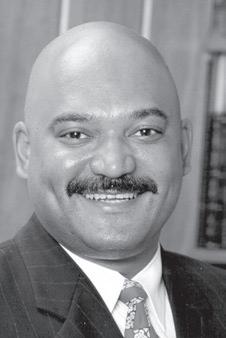




By Dan Gelston The Associated Press
Saquon Barkley knew the Eagles season rushing record could be his on Sunday with the type of stellar performance that has become the standard during his first season in Philadelphia.
As for the exact moment Barkley hit the milestone, he wasn’t sure — until the “MVP!” chants echoed throughout the Linc after a 9-yard run in the fourth quarter.
“The records are great, they put a smile on your face,” Barkley said, “but the season is far from over.”
Needing 109 yards to break LeSean McCoy’s record, Barkley rushed for 124 yards and pushed his season total to 1,623 in a 22-16 victory over Carolina.
Barkley needed just 13 games to pass McCoy, who rushed for 1,607 yards in 2013. He also overtook Wilbert Montgomery, who had 1,512 yards in 1978.
“I never wrote the goal down to break it,” Barkley said. “You’re always aware of it. That’s how I train. That’s

how I operate in the offseason. I want to be great.” Barkley also maintained his pace to break Eric Dickerson’s NFL single-season rushing record of 2,105 yards, set in 1984 with the Los Angeles Rams.
“That would be extremely cool to do,” Barkley said. “If it happens, it happens, and not with the mindset of, I’m scared to go try to do it. Whatever it takes to win football games.”
Barkley is averaging 124.8 yards per game. At that pace and with one more game to play than Dickerson, he would become the top single-season rusher in NFL history. He needs 483 yards over the final four games to top Dickerson’s 40-year-old record.
He averaged 6.2 yards on 20 carries against the Panthers to help the Eagles win their ninth straight game.
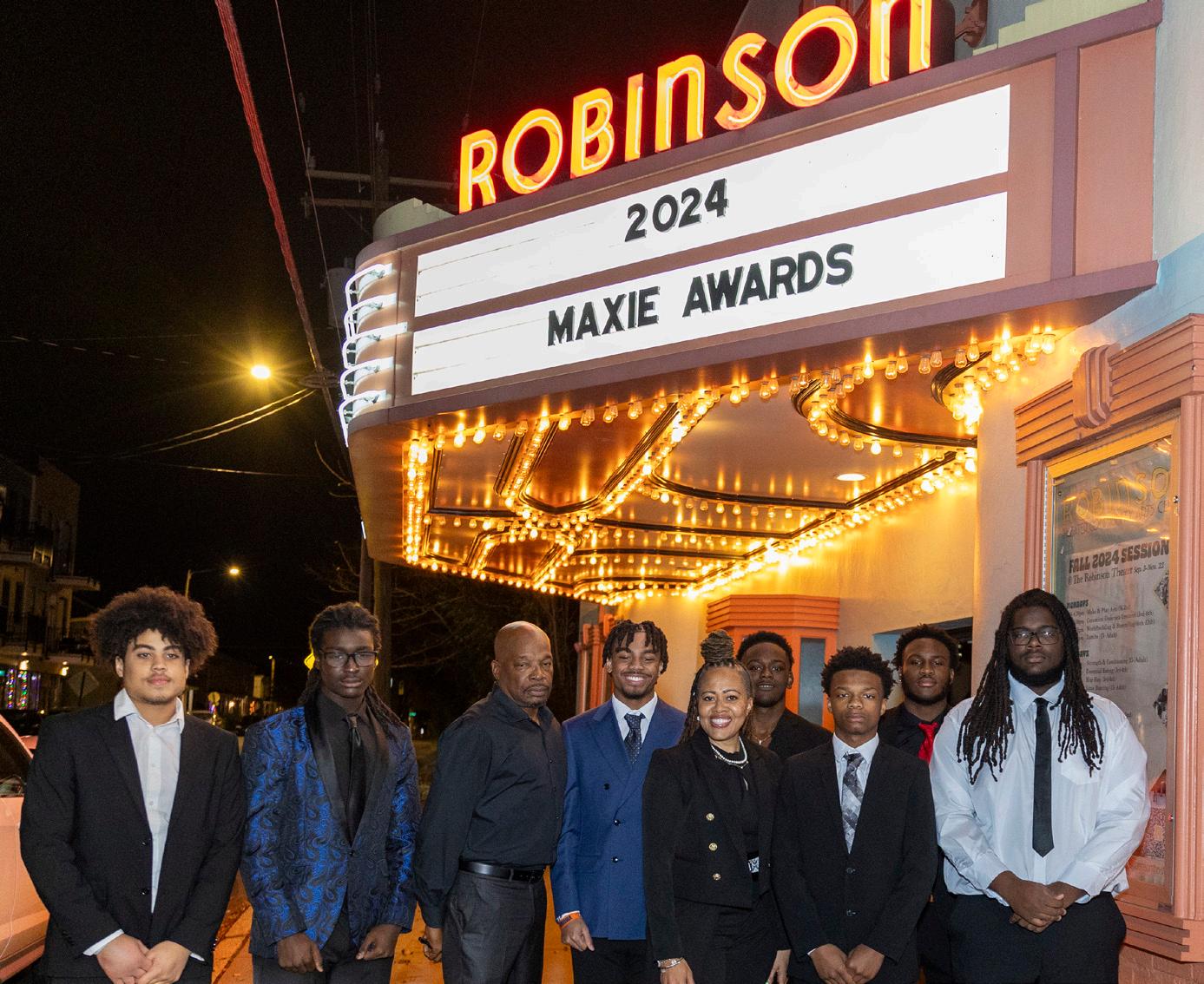
Free Press staff report
Richmond’s student-athletes stepped into the spotlight at the Robinson Theater Community Arts Center on Dec.
Free Press staff report
Legendary Olympian Jackie JoynerKersee will headline the RVA Sports Awards on Feb. 8, bringing star power to the annual celebration of Richmond area athletic achievements.
Joyner-Kersee, widely regarded as one of the greatest female athletes in modern history, boasts an impressive résumé that includes three Olympic gold medals, four World Outdoor Championships golds and the world record of 7,291 points in the women’s heptathlon.
In addition to her track and field dominance, Joyner-Kersee briefly brought her talents to Richmond in 1996, signing to play professional basketball for the Richmond Rage of the American Basketball League. She appeared in 17 games for the team, with a season-high of 15 points scored.
“We are thrilled to welcome Jackie Joyner-
Kersee to the RVA Sports Awards next year,” said Danielle Fitz-Hugh, vice president of community relations at Richmond Region Tourism. “Throughout her career and life, Jackie has broken records and barriers, while creating opportunities for more young people to get involved in sports.”
The event, hosted by the Richmond Region Tourism Foundation, will feature a “sneaker ball” theme, with attendees encouraged to pair formal wear with sneakers. Award nominations for the RVA Sports Awards, presented by Rosie’s Gaming Emporium and Colonial Downs, close Dec. 10. Finalists will be announced Dec. 15, and

public voting runs through Jan. 15 at rvasportsawards. com. Winners will be revealed during the Feb. 8 ceremony. The event will feature a silent auction benefiting the Richmond Region Tourism Foundation’s Sports Grant Program, which supports local youth sports organizations. Auction donations are welcome, including gift certificates and memorabilia. Event tickets are priced at $75, with VIP tickets—which include a red carpet reception—available for $125.
For more information, see visitrichmondva.com/rva-sports-awards.
Virginia Union’s historic season ends with loss to Valdosta State
Free Press staff report

Virginia Union University’s football team saw its recordbreaking season come to an end Saturday, Dec. 7, with a 49-14 loss to top-ranked Valdosta State in the NCAA Division II National Quarterfinals in Valdosta, Ga. The Panthers advanced further in the NCAA Playoffs, played more games, and totaled more yards than any team in the program’s 125-year history, cementing the season as the greatest in Virginia Union’s history.
Jada Byers closed out a remarkable year by rushing for 109 yards and a touchdown against Valdosta State, becoming the first Panther to surpass 2,000 yards in a single season. He finished with 2,061 rushing yards and 27 touchdowns, just one short of Andre Braxton’s school record of 28. Byers also completed his collegiate career as the all-time leader in rushing yards with 5,978 and rushing touchdowns with 71. On defense, Shamar Graham
led the team with 12 tackles, including 10 solo stops. Reginald Vick Jr. contributed four receptions, one of which was a touchdown.
“We didn’t play our best, but that was evident,” said VUU Coach Alvin Parker.
“That doesn’t take away the
remarkable season these kids had. I don’t want this loss to overshadow that. These guys had a heck of a season, broke a lot of records, and made a lot of history. I’m extremely proud of them. They’re probably going to soak in this a little more because they feel that they didn’t
play their best today. But it was an historical run.”
The Panthers wrapped up the 2024 season with a 10-4 record, a second straight CIAA championship, and a place in the NCAA Division II Elite Eight, solidifying their legacy in Virginia Union football history.

4 at the 2nd Annual Maxie Awards Banquet. The event honored the city’s best players and coaches, blending pride, celebration and community spirit.
The event, organized by Clarence Kenney of Noah Renaissance, recognized athletes and coaches from John Marshall, Armstrong, Huguenot and Thomas Jefferson high schools. With about 50 people in attendance, the evening combined dinner, a motivational speech and awards to highlight the achievements of Richmond Public Schools football players.
that recognizing these players for their achievements would inspire them to stay motivated and succeed.
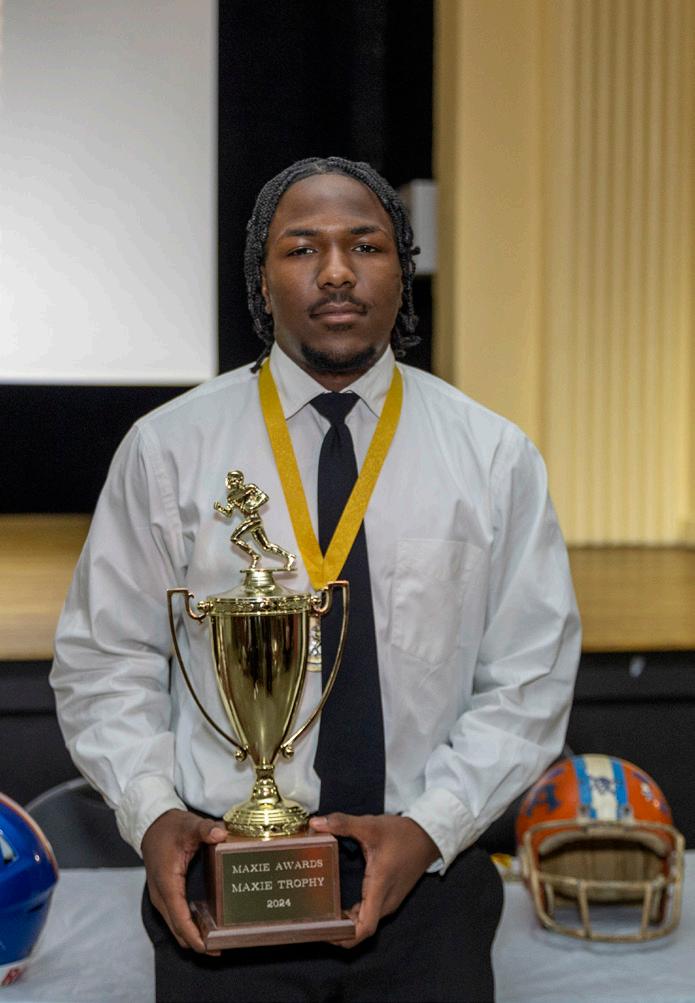
Founded in 2023 by Kenney, the awards are named after Maxie C. Robinson, a legendary Armstrong High School football coach who led the program for 40 years. Kenney, an Armstrong alumnus, created the awards to honor Richmond’s past and motivate young athletes to excel in sports and life.
Kenney personally funded this year’s banquet, contributing $3,000 of his own money due to a lack of sponsorships. He added that it is important to “bring attention to city kids” and expressed hope
The evening began with dinner at 7:30 p.m. followed by opening remarks and a keynote address from Alvin Parker, head football coach at Virginia Union University. Parker, a former VUU running back, encouraged the athletes to focus on making choices that would lead to success.
“Make the choices that are going to get you to where you want to be,” he said.



Gary L. Flowers, an African American history enthusiast, has devoted over 35 years to civil rights law and activism.
He’s worked alongside notable African American trailblazers such as the Rev. Jesse L. Jackson and former Gov. L. Douglas Wilder and continues to battle the suppression and inequities Black people face today. Whether through his tours in Historic Jackson Ward, his national weekly radio show or his public policy consultancy, Flowers continues his work to preserve African American history and improve the lives of Black people.
Flowers believes his walking tours are integral to preserving African American history, noting that history can repeat itself and it’s important to know what has happened in the past.
The Southern Aid and Insurance Company, a black-owned insurance company, and the black-owned St. Luke Penny Savings Bank were founded in Jackson Ward. Businesses such as these formed in Black communities throughout the country during segregation because white institutions didn’t offer services to the Black community.
“When white America turned against us, we turned to each other,” he said, referring to the discrimination Black people faced during the Jim Crow era.
The Trump presidential victory drives Flowers to take even further action. Committed to preserving the history of Jackson Ward, the birthplace of Black capitalism in the U.S., Flowers cautions that the Black community may once again
“This is a poignant moment,“ Flowers said. Flowers, a Richmond native, returned home to care for his sister and late mother over a decade ago after living in Chicago, Washington, D.C. and Boston. He enjoys jazz, dancing and meeting new people.
Meet the affable social justice veteran and this week’s Personality, Gary L. Flowers:
Volunteer position: President, Theban Beneficial Club of Richmond.
Occupations: Owner, Walking the Ward with Gary Flowers; host, “The Gary Flowers Show”, owner, Gary Flowers & Associates.
Date and place of birth: Feb.13 in Richmond.
Where I live now: Richmond.
Education: B.A., University of Virginia, C.L.E.O. Fellow, Georgetown University Law Center, teaching fellow, Institute of Politics, Kennedy School of Government, Harvard University.
Family: Older sister, Jan Yolette Flowers.
Theban Club of Richmond: We are a 122-year-old beneficial organization founded in 1902 in Jackson Ward. The club was established after the post-slavery Reconstruction Period was dismantled during Jim Crow.
Club mission: The mission of Theban is to provide fellowship to its members and mutual benefit to the Black community of Richmond.
Founders: Chitman M. White,

Y.
O.
Robert C.
Willie S. Funn, Chester P. Carter, Joseph A. Ackson and William Ross.
When Theban was founded: March 2, 1902.
Club Motto: All for One, and One for All!
When and why I became a member: I became a member in 1994 to provide mutual benefit to the Black community of Richmond and follow three generations of Fountain and Flowers family members.
Age range of members: 48 to 90 years of age.

Membership application process: Candidates 18 or older must be qualified voters and submit an application to the president or the membership
chair, endorsed by two bona fide members, for processing by the membership committee.
Presidential tenure: One year.
Goal as president: To restore Theban to be of mutual benefit to the Black community in Richmond.
Strategy to achieve goal: Solicit new members who are driven to improve the Black community in Richmond and join forces with other beneficial/service organizations, similarly missioned like the Astoria Beneficial Club.
How Theban remains relevant in 2024: Theban will remain relevant as we encourage the mantra of what our ancestors lived: In the Black community, we must turn to each other and not on one another.
How I’ve seen Theban make a difference: Most recently, Theban donated financial and household staples for furloughed federal workers during the end of the pandemic.
How I will honor our history as Theban president: I will use my position as president to incent new and existing organizations to understand we are entering the “third Reconstruction Era” in U.S. history, and, thus, we must align to preserve and build a more perfect union.
Upcoming events: I will propose an annual mutual benefit service event with the Astoria Beneficial Club in the spring of 2025.
How I start my day: I begin each day with the statement, “Thank you, Lord!” and “Forgive me, Lord!” while I read The Upper Room Daily Devotional and recite a prayer of thanks. Three words that describe me:
Faithful, family and friendly. Best late night snack: Potato chips.
Top three on my playlist: Duke Ellington, Earth, Wind & Fire and James Brown.
Something I love to do that most people would never imagine: Be quiet.
A quote that inspires me: “It is not a disaster to be unable to capture your ideal, but to have no ideal to capture. It is not a disgrace to not reach the stars but to have no stars to reach. It is not failure, but low aim which is the sin,” — Dr. Benjamin E. Mays
Inspirational book: “Stolen Legacy” by George
What I’m reading now: “The Message” by Ta-Nehisi Coates. Next goal: Be a better humanitarian.







Press staff report
The Elegba Folklore Society will host its annual Capital City Kwanzaa Festival on Dec. 28, offering a daylong celebration of African American culture and heritage.
The festival, taking place from 1 to 7 p.m. at the Greater Richmond Convention Center, will feature performances, an African market, children’s activities, ongoing workshops and a keynote address by Dr. Gina Paige, co-founder of African Ancestry.
Now in its 34th year, the event is one of the largest Kwanzaa celebrations on the East Coast and will highlight the holiday’s principles of unity, self-determination and collective responsibility. The festival’s theme is “Knowledge of Self.”
“Knowledge of the African origin stories of African Americans, and the world, and knowledge of the legacies that support the power of identity can create a strengthening cul -

tural affinity by offering a foundational reference for thinking and well-being,” said Elegba Folklore Society’s Artistic Director Janine Yvette Bell. Performers include singer Kia Bennett and the Burning Fire Reggae Band, known for their high-energy performances. The Elegba Folklore Society’s musicians and dancers will also take the stage, presenting interpretations of African traditions.
Paige’s keynote address will explore the importance of tracing and celebrating African ancestry. African Ancestry, the company she co-founded in 2003, helps individuals of African descent discover their ancestral roots using DNA testing. Unlike other genetic testing companies, African Ancestry focuses solely on African lineages, connecting participants to specific countries and ethnic groups within Africa.
The event takes place on Ujima, the third day of Kwanzaa, which emphasizes collective work and responsibility. In keeping with the theme of Ujima, the festival will celebrate shared heritage through its various cultural activities. Created by Maulana Karenga in 1966, Kwanzaa is celebrated by an estimated 28 million people annually.
Tickets are $6 for general admission, $5 for students and seniors, with free entry for children under 12. Group rates are available for advance purchases.
The festival will include an ancestral libation ceremony, cultural performances and a Q&A session with Dr. Paige, who has helped numerous people strengthen their cultural connections through African Ancestry’s services.
COVID-19 protocols will be in place, including hand sanitizing stations and encouragement of social distancing. For more information, visit efsinc.org or call (804) 644-3900.
Free Press staff report
Lewis Ginter Botanical Garden has again topped USA Today’s ranking of botanical garden holiday light displays, drawing national recognition for its elaborate nighttime spectacle.
The Dominion Energy GardenFest of Lights, running through early January, invites visitors to explore “Homes & Habitats: A Celebration of Connection” through millions of illuminated displays that showcase interconnected environments.
Lewis Ginter Botanical Garden’s President and CEO Brian Trader praised the staff and volunteers, calling the recognition “a testament to their hard work and creativity.”
This year’s theme transforms the garden into a vibrant landscape of interconnected ecosystems, from wetlands and rainforests to deserts and grasslands. Visitors will discover light displays representing various natural habitats, each highlighting the intricate relationships within different environments.
The 2024-25 display offers several new attractions, including interactive light features in the Children’s Garden and Cochrane Rose Garden. Visitors also can hunt for Pokémon-themed light displays scattered throughout the garden.
Henrico High School’s marching band will perform in the Rose Garden on Dec. 17 at 6 p.m., adding musical entertainment to the festive atmosphere. A dog-friendly

night is scheduled for Dec. 16, allowing leashed dogs to explore the illuminated gardens
Familiar favorites return, such as model trains in the Kelly Education Center and a Warming Fire in the Children’s Garden where guests can roast s’mores and enjoy hot chocolate.
Tickets must be purchased online in advance, with arrival times between 4 p.m. and 8:30 p.m. Pricing varies by peak and non-peak dates, with discounts available.
The display runs through Jan. 5, celebrating the garden’s 40th anniversary with a new timeline exhibit in the Robins Visitors Center.
For more information, visit lewisginter. org.







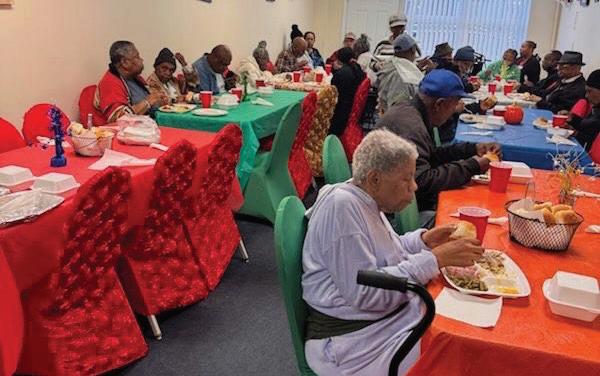
By Adelle M. Banks Religion News Service
Former President Barack
Obama at a Dec. 5 forum on democracy pointed to the partnership of houses of worship and the success of megachurches as examples of ways to build bridges and foster pluralism.
“The pluralist ideal is what allows a Christian church and Muslim mosque to sit side by side on the same city block — and then maybe agree to share a parking lot,” Obama said at the Obama Foundation’s Democracy Forum in Chicago. He acknowledged that the work of pluralism — or find-
ing ways to “live alongside individuals and groups who are different than us” — is not easy and takes time.
“Pluralism is not about holding hands and singing ‘Kumbaya,’” he said in his remarks. “And building bridges may require you to deal with people who not only disagree with you, but do not respect you.”
He said he experienced that as president, “where I was negotiating with people who made it pretty clear they didn’t think I should be president, legally, morally,” but he and they strove nevertheless to listen, foster relationships and find compromise.

Obama also said pluralism does not mandate a denial of people’s unique circumstances but does call for understanding “the possibility of a win/win situation, rather than a zerosum situation.” He cited the
Dr. Martin Luther King Jr. as an example of working toward justice with an emphasis on “we” rather than “them” or “us.”
“That’s what King understood in framing the issue, not simply as an African American issue, but as an American issue,” Obama said. “And we have to acknowledge that we all have multiple identities. I’m a 63-year-old African American man, for example, but I’m also a husband, I am a father, and a Christian who is constantly wrestling with doubts about organized religion.”
The 44th U.S. president added that pluralism is successful when it reflects action and not just words.
Free Press staff report
Hildreth “Hal” Walker Jr., a pioneering laser scientist and dedicated STEM advocate, died Sunday, Nov. 24, 2024, at 91 in Cape Town, South Africa. Walker was renowned for his contribution to the Apollo 11 Moon Landing in 1969, when he became the first person to successfully fire the KORAD-1500 Ruby Laser to the Moon. Known as the Lunar Ranging Experiment (LURE), it was the only interactive planetary experiment conducted during the Apollo 11 mission. The experiment used a retroreflector array placed on the lunar surface by astronauts Neil Armstrong and Buzz Aldrin to measure the Earth to moon distance with unprecedented precision.
LURE provided critical data on the moon’s orbit, Earth’s rotation and the gradual drift of the moon away from Earth. This success demonstrated the potential of laser technology for space exploration and set the foundation for decades of lunar research.
In 1994, Walker’s work was honored with a recreation of
his historic experiment in the Smithsonian Institution’s National Museum of American History in Washington, D.C. The exhibit, “The New Moon,” in the museum’s permanent “Science in American Life” section, celebrated his contributions to science and innovation.
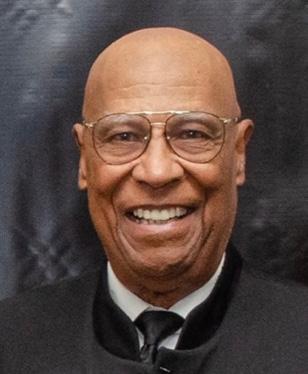
on empowering African-American and minority students through science and mathematics programs. At the invitation of President Nelson Mandela, the couple established A-MAN, Inc., in South Africa, bringing science and technology education to township schools across the country.
Beyond his work in laser science, Walker was a tireless advocate for STEM education.
He co-founded the AfricanAmerican Male Achievers Network, Inc. (A-MAN) with his wife, Bettye Walker. The nonprofit organization focuses
Walker graduated cum laude from Pacific Christian College with a bachelor’s in business technology management. He was a lifetime member of Kappa Alpha Psi Fraternity, and held leadership roles in
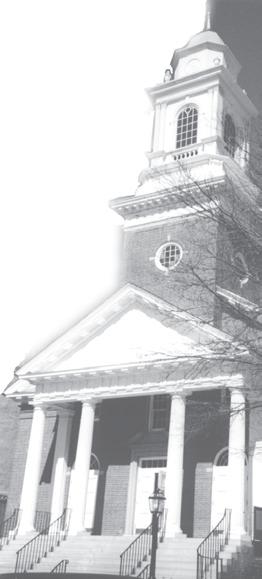
the fraternity’s Los Angeles Alumni Chapter and the Cape Town - Western Cape Alumni Chapter in South Africa. He also was a member of Sigma Pi Phi Fraternity, Delta Xi Chapter, and served as president of the National Space Society of South Africa.
He is survived by his wife, two children, Allison and Raymond, and seven grandchildren: Raishauna, Justin, Kara, Lance, Nile, Mecca and Asia.









